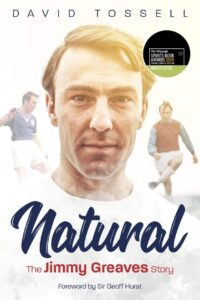
I’m doubly lucky. I’ve got two signed copies of a Jimmy Greaves autobiography and each book is different. In both cases, Greaves thanks a co-writer so I have two semi-autobiographies. The names of these demi-semi-autobiographies are ‘A FUNNY THING HAPPENED ON MY WAY TO SPURS’ and ‘GREAVSIE’. It would be hard to miss that the titles have something in common. Every time Jimmy Greaves and his ghostly friends write an autobiography, they use block capitals FOR THE TITLES.
They also tell us something about changing times. Back in the days when the first book appeared (1962) readers could cope with allusion. It is a punning reference to the Stephen Sondheim musical A Funny Thing Happened on the Way to the Forum which opened on Broadway in May of that year. Strangely, the film version came out in 1966 and the England World Cup squad went to watch it prior to beating West Germany. A funny thing.
By 2003 our modern readership can just about cope with a one word title. There is sadness, too, in the overly familiar moniker ‘Greavsie’, the persona adopted by the reformed alcoholic Greaves as part of a once-popular TV double act ‘Saint and Greavsie’. This offered him a form of earthly salvation, under the tutelage of a grinning St John, when he had reinvented himself as a pundit, years after his glittering soccer career had ended.
It is only fair to point out here that Jimmy Greaves was the finest goal-scorer this writer has ever seen, a kind of Raul-plus, and Raul was fantastic at his best. JG was the coolest of finishers with the ability to scoot past very good defenders before simply slipping the ball into the back of the net and there was nothing they could do to stop him. I had a friend at university who was a Spurs fan. Whenever we met, if I so much as mentioned his hero, he would fly away in a mental rapture and it would be several minutes before he landed back on earth.
The problem with the first book is that it was brought out when he was 22, timed to cash in on his escape from the unhappy stint playing for Milan, a return of 9 goals in 12 games clearly reflecting his talent but in those days, abroad was abroad, cultures were very different and the cockney cocksparrer didn’t fit in. So, back to London with a big money transfer. He had scored 124 goals in 157 games for Chelsea before his unhappy Italian sojourn and was welcomed home by Double winners, Spurs. What a talent! But how do you write about your own genius since it all comes so naturally? And yet it turned out that there was much more to him than either he or the wider world could cope with back then. He gave in to the Dark Side, Luke. Poor old Greaves. The story has grown into legend that Ramsey’s preference for Geoff Hurst in the World Cup Final drove him over the edge. How different it all might have been if substitutes were allowed back in ’66.
The second book gets round this genius-thing pretty well by dealing, fairly honestly, with his colossal fall from grace into an alcoholic nightmare world. It deals with other things, too, including the almost obligatory ‘state of the game today’ section and it deliberately does not try to leave the reader green with envy. Who would want to end up like him throwing it all away? He might have scored 220 goals in 321 appearances for Spurs plus sundry other league goals and 44 in 57 games for England but we read about a failed man who has had the good fortune, family support and the strength of character to do something about it.
Both books are basically honest, team efforts about a supremely talented individual. The first one pretends to be just looking back but is clearly suggesting it is only the thrilling first half. The second book spends 300 pages dealing with the first 30 years and 80 dealing with the next 30. That gives some clue as to which part of his life he was most pleased to look back on.
I suppose I would have liked to read just one Jimmy Greaves autobiography, possibly even written by himself, when he was 44 and looking back on a hugely successful career, a lorra laughs and maybe a few tears along the way. You flick through the two sections of photographs – and who doesn’t look at the photos before embarking on the reading bit? As you do so, you have a growing feeling of trepidation that, after the glorious pics of Jim foxing yet another defence, there will be the ‘loser Jim’ to face, and there is. Thankfully, you are then given the blessing of a family shot of doting grandparents and six of his ten grandchildren, all bright as buttons.
Whilst I suppose each ghost-writer did his bit, forty years apart, what intrigues me most is what the young Jim and the older Greavsie might say to each other if, time warps permitting, they could meet face to face?
Graeme Garvey
Buy: A funny thing happened on my way to Spurs
 Jimmy Greaves remains the greatest goalscorer in English football history, with a record of 357 top-flight goals that may never be surpassed.
Jimmy Greaves remains the greatest goalscorer in English football history, with a record of 357 top-flight goals that may never be surpassed.